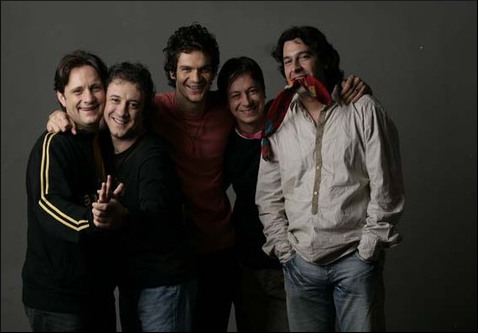Vama Veche (The Old Custom) is a Romanian alternative rock band. Their name comes from a popular Romanian sea resort, which over the years has become the epitome of teenage bohemia, the –the place to go if you’re in search of a liberating holiday experience. The band came into being in 1996, and their songs, -- discussing love, – which discuss both light and personal themes, ranging from love to break-ups, despair, sexuality, and socializing – have enjoyed massive success amongst Romanian youngsters. “Am doar optispe ani” (I am only eighteen-years-old) is a feel-good song celebrating the apparently carefree, bubbly life that eighteen-year-olds revel in. It is a song that represents life seen through the eyes of young adults, who have yet to face hardships, tests, and trials. However, behind the light tone, there also lie hints of the youngsters’ conflicting concerns: relaxation and love versus future career plans.
“'Am doar optispe ani' (I am only eighteen-years-old) is a feel-good song celebrating the apparently carefree, bubbly life that eighteen-year-olds revel in."
In Romania, eighteen is the age when teenagers legally become adults and are therefore allowed to take control of their own lives and take responsibility for their own actions. However, as the song suggests, eighteen is also a mythical age when nothing touches you, when you are “nebun, iubes[ti] si nu a[i] bani” (crazy, in love, and penniless). It is an age when “visele / Se implinesc/ Cand bat din palme sau cand clipesc/ Inspir (respir) iubire, /Expir (maninc) iubire” (dreams come true/ at the clasp of the hand/ or the blink of the eye/ I breathe in love/ and I breathe out love) and when “nimeni nu-mi sta in drum,/am soseaua mea doar cu-n singur sens ma va duce undeva” (nobody stands in my way,/ I have my own one-way motorway/ that will surely take me there). It is a time when the world is yours and you feel like you’re invincible and are literally bursting with happiness and joie de vivre.

On the other hand, eighteen is also a watershed moment, when one has to decide the course of their future, since “scoala s-a terminat,/ Libertate frate, poate facultate, si viata de noapte” (school is over/ maybe I’ll go to Uni next,/ freedom and night life, my brother). It should not come as surprise that “Am doar optiste ani” is extremely popular amongst teenagers and is often played at coming-of-age parties. Though written in standard Romanian, the song includes some contractions and colloquial terms specific to teenage-speak, such as “bacu” (baccalaureate) and “optispe” (as opposed to “optsprezece,” meaning “eighteen”).



